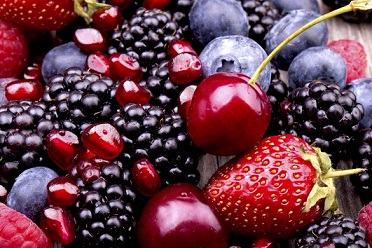Scientists From Spain and Brazil Discover That Polyphenols From Plants Provides Protective Effects Against COVID-19 Disease
Source: Polyphenols and COVID-19 Feb 22, 2021 4 years, 9 months, 3 weeks, 3 days, 17 hours, 51 minutes ago
Researchers from the Josep Carreras Leukaemia Research Institute (IJC)-Spain, Sao Francisco University-Brazil and the Pontifical Catholic University of Campinas (PUCCAMP)- Brazil have in a new study discovered that
polyphenols from plants are able to provide protective effects against the COVID-19 disease.

More and more countries besides the United States and the United Kingdom, are turning towards herbs and phytochemicals as prophylactics and therapeutics to protect or treat themselves against the COVID-19 disease, often with interesting results.
The COVID-19 disease is characterized by cytokine storms, acute respiratory distress syndrome (ARDS), and systemic inflammation–related pathology and has already killed more than 2.5 million of people worldwide.
As aged and obese COVID-19 patients exhibit an enhanced inflammatory status, they represent a high-risk cluster for rapidly progressive clinical deterioration. These individuals present comorbid disorders and immunosenescence that may promote viral-induced cytokine storm and expression of molecules acting as virus receptor as angiotensin I converting enzyme 2 (ACE2) and CD26 (dipeptidyl-peptidase 4), resulting in respiratory failure and increased morbidity and mortality. A better knowledge of SARS-CoV-2 infection in inflammatory-associated high-risk population is essential in order to develop the therapies needed to combat or prevent severe COVID-19.
In this study the researchers reviewed the pathogenesis and clinical implications of inflammatory disorders and disease markers associated to senescence in COVID-19 patients and the emerging evidence to argue that a high intake of polyphenols may have a protective effect on SARS-CoV-2 illness severity.
The study findings were published in the peer-reviewed journal: Integrative Physiology.
https://www.frontiersin.org/articles/10.3389/fphys.2020.612268/full
It has been found that age is undoubtedly the most critical risk factor for death in COVID-19 patients. Also, the severity of COVID-19 is associated with several other comorbidities. Although around 80% of confirmed SARS-CoV-2 positive cases exhibit mild symptoms or no symptoms at all, the remaining 20% of patients may develop severe symptoms, potentially leading to death.
Hence, a better knowledge of SARS-CoV-2 infection in inflammatory-associated high-risk populations is essential to develop the therapies needed to combat or prevent severe COVID-19.
The study team reviewed the pathogenesis and clinical implications of inflammatory disorders related to senescence in COVID-19 patients.
The study team found that a high intake of polyphenols may have a protective effect on patients with COVID-19 and prevent disease progression.
It has been found that older adults and people who are obese are more likely to develop an enhanced inflammatory status if they get infected with SARS-CoV-2. These individuals represent a high-risk for rapidly progressive clinical deterioration.
Also many of these individuals present comorbid disorders and immunosenescence, which is the gradual deterioration of the immune system as people
age. It involves the body's capacity to respond and sustain the long-term immune memory acquired by infection or vaccination.
Hence as a result, aged and obese individuals may experience a viral-induced cytokine storm, including the expression of molecules acting as virus receptor as angiotensin-converting enzyme 2 (ACE2) and dipeptidyl-peptidase 4 (CD26). The cytokine storm can lead to respiratory failure and an increased risk of mortality.
Typically Polyphenols are phytochemicals and are dietary components that help prevent inflammatory comorbidities. They are a category of compounds naturally found in foods like herbs, fruits, vegetables, wine, dark chocolate, and tea.
It is known that polyphenols help reduce inflammation, which is the culprit of many chronic diseases such as heart disease, hypertension, and diabetes.
https://pubmed.ncbi.nlm.nih.gov/20463039/
https://pubmed.ncbi.nlm.nih.gov/24629563/
https://pubmed.ncbi.nlm.nih.gov/24093677/
https://pubmed.ncbi.nlm.nih.gov/25621503/
https://pubmed.ncbi.nlm.nih.gov/29285143/
https://pubmed.ncbi.nlm.nih.gov/32610256/
Numerous past studies have shown that polyphenols can help manage blood pressure levels and keep the blood vessels healthy and flexible.
Apart from blood sugar and blood pressure, polyphenols can reduce chronic inflammation.
Interestingly, several plant-derived compounds, such as polyphenols, have been shown to effectively inhibit RNA viruses.
https://pubmed.ncbi.nlm.nih.gov/32113846/
https://chemrxiv.org/articles/preprint/Plant-Derived_Natural_Polyphenols_as_Potential_Antiviral_Drugs_Against_SARS-CoV-2_via_RNA_dependent_RNA_Polymerase_RdRp_Inhibition_An_In-Silico_Analysis/12312263/1
Berries, apples, chocolate, red wine, olive oil, and turmeric are some of the food and beverages that are high in polyphenols.
This study shows that since polyphenols reduce inflammation, they could help combat COVID-19. Polyphenols might help protect the body from the harmful effects of the disease.
The study team noted that "inflammaged patients" or those with chronic inflammation are vulnerable to adverse clinical outcomes when sick with COVID-19. They emphasize that evidence point to the benefits of polyphenols for senescence and inflammation prevention. Therefore, the compounds can be used for treating SARS-CoV-2 infection and prevent disease progression.
https://pubmed.ncbi.nlm.nih.gov/23121441/
https://pubmed.ncbi.nlm.nih.gov/30279143/
https://pubmed.ncbi.nlm.nih.gov/20306120/
https://pubmed.ncbi.nlm.nih.gov/26093063/
https://pubmed.ncbi.nlm.nih.gov/22933405/
https://pubmed.ncbi.nlm.nih.gov/25568096/
https://pubmed.ncbi.nlm.nih.gov/22219513/
https://pubmed.ncbi.nlm.nih.gov/18460116/
https://pubmed.ncbi.nlm.nih.gov/32745074/
Dr Alessandra Gambero from the Life Science Center, Pontifical Catholic University of Campinas (PUCCAMP)-Brazil told Thailand Medical News,"It is hoped that the clinical studies under development can add valuable information about this hypothesis and help reduce suffering and mortality imposed by SARS-CoV-2 infection."
The study team concluded, “Thus, the data presented here reinforce the hypothesis that polyphenols could have the potential for their use for senescence and inflammation prevention and, therefore for the treatment/management of patients with viral infections such as SARS-CoV-2. It is hoped that the clinical studies under development can add valuable information about this hypothesis and help reduce suffering and mortality imposed by SARS-CoV-2 infection.”
For more on
Polyphenols and COVID-19 , keep on logging to Thailand Medical News.
